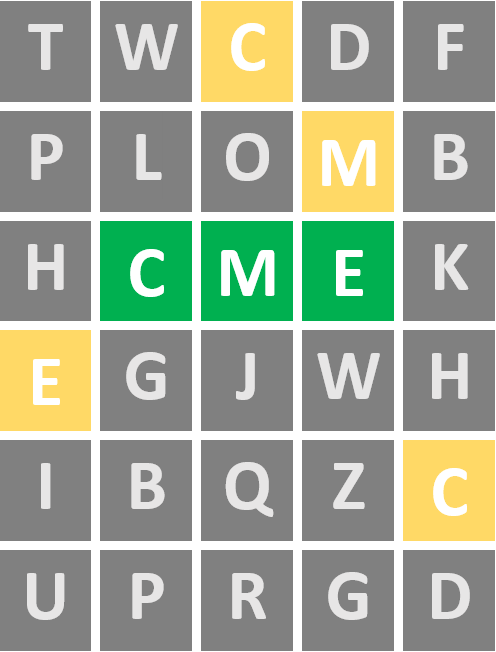
If you are one of the thousands of people who play the online word game Wordle, chances are you were introduced to the game from a friend or family member. From its beginning as a game created by a Brooklyn man for his sweetheart that was soon shared with friends, Wordle grew to having as many as 300,000 users within two months of being published online. Recognizing the fast-growing appeal, The New York Times purchased the game, and it continues to grow in popularity. We admit that we play it most days and love to share our wins with friends and colleagues.
Are there lessons that could be applied to CPD that would make our programs as addictive to learners (dare we say, viral CPD)? What is it about Wordle that makes us crave the daily puzzle?
Through an examination of our own habits, and talking with others, we’ve discovered three aspects of Wordle that may offer practical tips for our own unique CPD community.
1. Wordle is quick, simple and challenging enough to experience the euphoria of conquest.
Wordle is a game, and the appeal of gamification as a CPD education strategy is not new in our industry. There are examples where knowledge or skills conducive to short bursts of train-and-test design, as well as assessment-feedback loops, have been identified and successfully designed into a CPD game format. What is different about Wordle? The time and effort commitment to Wordle is typically just a few minutes. The platform is simple and engaging, and players are rewarded with the satisfaction of winning or conquering the game if they correctly identify the answer to the daily word puzzle. However, the brilliance and attraction of Wordle could lie in the selection of five-letter words as the basis for the game. Words fewer than five letters would likely be too easy, and words with more than five letters too challenging and not enjoyable for most players. The takeaway for CPD designed as a game — whether alone or complimentary to a comprehensive curriculum — is to incorporate knowledge and skills challenges equivalent to the Wordle five-letter word sweet spot, which should provide learners with the satisfaction of success and an opportunity to experience the euphoria of conquest.
2. Wordle allows users to learn and improve as they compete against their own record.
Assessing the viral and persistent popularity of Wordle, Professor Barry Smyth, digital chair at the University College Dublin School of Computer Science, analyzed tweets posted by Wordle players. He found that as players gained experience, they became better at the game. Using a sound methodology, he found that players solve the game in fewer rounds the more they play, suggesting that players learn and improve with practice. As CPD planners and designers, we should consider the skill-building that can occur through serial education design and which skills can be improved through repetition of exposure.
3. Wordle strategies are prized and shared, providing a model for how best practices can be made viral.
A casual reading of online blogs or stories among Wordle users will demonstrate that players develop their own strategies to beat the game, and they often share these strategies with others. In our own experience, taking smart guesses at the right answer worked when we first started the game, but our personal strategies became more targeted through use and have improved our personal win rates. We’ve been eager to share these strategies with family, friends and colleagues. We enjoy doing something better and being more successful in the game, and these “win” strategies are valuable currency for us to share. Educational content that allows users to hone their skills and easily share best practices with their networks contributes to the elevation of skills across communities, which is a unique function of continuous professional development. Equipping learners with opportunities to share and learn with others is a valuable aim for CPD design.
In conclusion, do you also feel “on top of the ‘Wordle’” when you conquer a daily puzzle? We’d love to hear other ideas on best practices for making CPD as addictive as Wordle! What tips would you add?
 Caroline O. Pardo, PhD, CHCP, FACEHP, is a longstanding member of the Alliance community, with professional experience in independent medical education outcomes, strategy, research and grant management. Pardo currently serves as senior vice president of education strategy, Clinical Education Alliance. She is always up for a brainy challenge, like maintaining a Wordle streak, and is excited to be a part of the live conferences within the Alliance professional community this year.
Caroline O. Pardo, PhD, CHCP, FACEHP, is a longstanding member of the Alliance community, with professional experience in independent medical education outcomes, strategy, research and grant management. Pardo currently serves as senior vice president of education strategy, Clinical Education Alliance. She is always up for a brainy challenge, like maintaining a Wordle streak, and is excited to be a part of the live conferences within the Alliance professional community this year.
 Kevin Obholz, PhD, has been fully committed to medical research and education for 25 years and is a long-standing member and contributor to the Alliance. Obholz currently serves as senior vice president of education strategy, Clinical Education Alliance, and as the general manager-oncology/hematology at Clinical Care Options. He thanks Dr. Pardo for contributing to his Wordle habit.
Kevin Obholz, PhD, has been fully committed to medical research and education for 25 years and is a long-standing member and contributor to the Alliance. Obholz currently serves as senior vice president of education strategy, Clinical Education Alliance, and as the general manager-oncology/hematology at Clinical Care Options. He thanks Dr. Pardo for contributing to his Wordle habit.